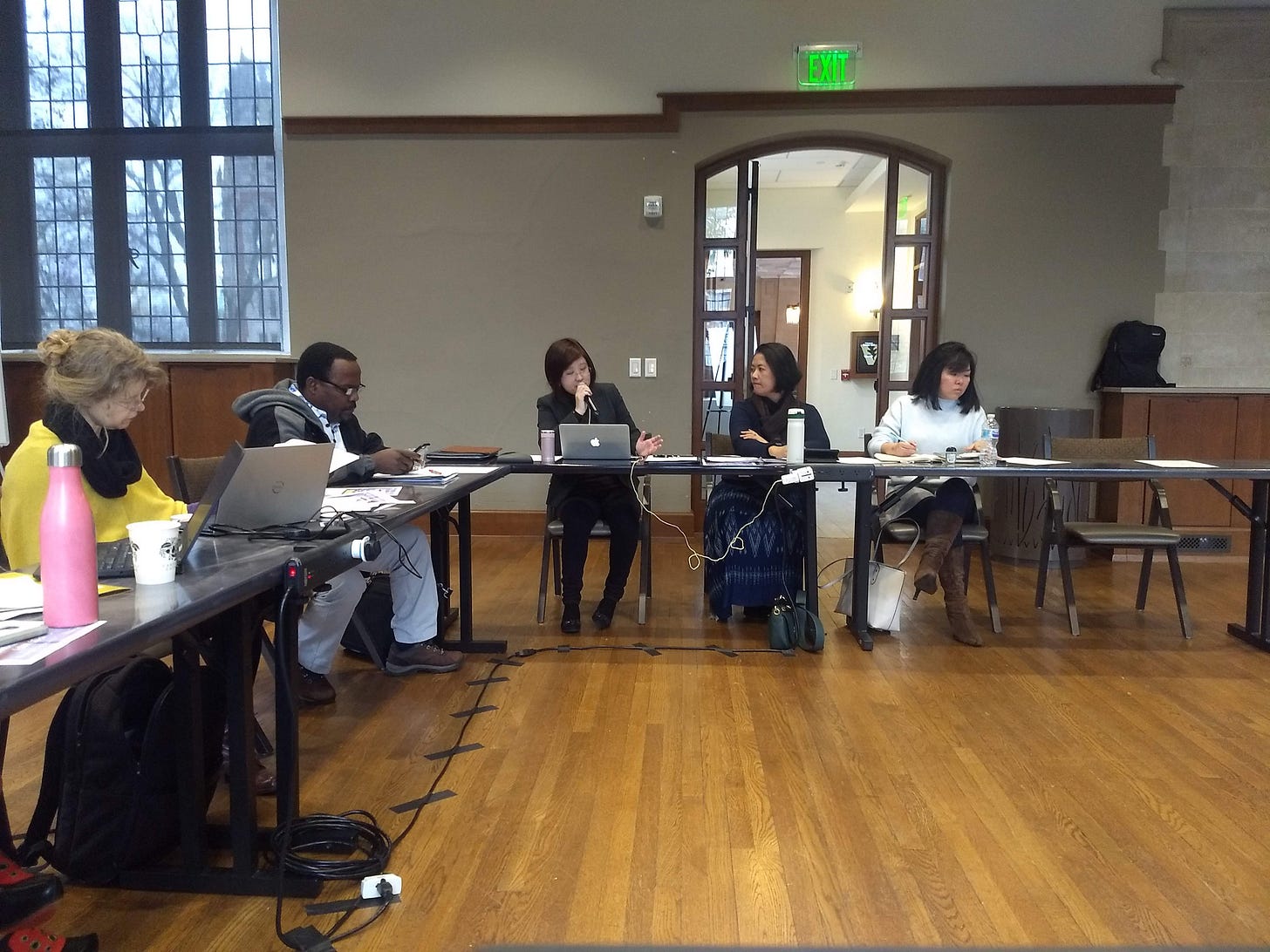This post is the (explosive?) conclusion to my reflections on the two-day workshop my colleague Joy Calico and I hosted at Vanderbilt in mid-February. If you need to catch up, be sure to read Part I.
To recap briefly: The workshop was inspiring in the moment but left me severely deflated about the level of conversation happening in many corners of the U.S. classical music industry. Too many people just don’t get it, and that has to change.

The Study Day
Just soak in this incredible lineup of participants and papers:
Dr. Rachel Beckles Willson (SOAS, Univ. of London, UK)
- “Existence in the Emergency: Reflections on Musicology and Orchestras”
Dr. Joy Calico (Vanderbilt University, USA)
- “Opera at the Borders of Art and Power: A Genre in the Global Marketplace”
Dr. Silvia Glocer (Universidad de Buenos Aires, Argentina)
- “Jewish Musicians in Exile in Argentina During the Nazi Period (1933-1945)”
Dr. Yvonne Liao (Oxford University, UK)
- “Unsold Global”
Dr. Nachaya Natchanawakul (Mahidol University, Thailand)
- “The Influence of Western Music in Thailand”
Dr. Misako Ohta (Kobe University, Japan)
- “Several Thoughts about Transnational Approaches to Historical Music Research”
Dr. Christian Onyeji (University of Nigeria—Nsukka)
- “Art Music in West Africa: Trends, Impact, and New Directions”
Dr. Douglas Shadle (Vanderbilt University, USA)
- “Community at Home, Universality Abroad: The US Classical Music Identity Crisis”

I’ve never encountered as diverse a set of viewpoints in a single room as I did here. And since it would take up way too much space to go over every paper in detail, I’ll focus only on a handful of key takeaways.
(1) Several participants questioned the very premises of the workshop. What do the phrases “Western,” “classical music,” “global,” and “marketplace” mean in the first place? And these discussions weren’t “just semantics.” Words matter, and taking a step back to ask fundamental questions doesn’t happen often enough.
These concepts—especially “Western”—were originally developed to reflect (and solidify) specific power relations in international political and economic arenas. What individuals “count” as “Western” (in music or otherwise) can also differ from place to place, especially outside Europe and the United States.
Dr. Onyeji, for example, pointed out that, in Nigeria, “Western music” is not simply a collection of works, or even a social practice. It’s an entire matrix of power revolving around individual “ownership” of musical expression. In his own cultural heritage, even music with an identifiable author is the community’s collective property.
(Seems like this topic came up in a different context earlier in the workshop…)

(2) We encountered example after example of situations where the significance or meaning of a musical activity wasn’t obvious—at all—despite direct connections to the West.
Dr. Liao analyzed the complex social, economic, and religious dimensions of J.S. Bach organ recitals in Hong Kong’s Anglican parishes in the 1920s. (!)
Dr. Natchanawakul introduced us to an all-girl jazz band hosted by a Roman Catholic mission school in 1930s Thailand. (!)
Dr. Ohta explained that Stephen Foster songs were ultra-popular in pre-World War II Japan. (!)
(3) The global movement of people, materials, and ideas makes not only musical meaning, but how we come to know music history, hard to pin down without a profoundly curious and empathetic disposition.
Dr. Glocer’s paper, for example, explained how the personal archives of Jewish refugees who fled to Argentina during the Holocaust often remained in the hands of family members, not research libraries. These musicians made significant contributions to classical music culture in the region and participated in vast international networks, including those that supported new composition. Losing these materials would erase a large part of the country’s musical history, leaving major gaps in our collective knowledge. Dr. Glocer’s work includes not only interpreting historical documents but stitching them together into a usable archive for later research.

Perhaps needless to say, the workshop left me very energized about the future of intercultural scholarly dialogue. We experienced many moments of mutual recognition and shared experience—“I didn’t know I had a musical sibling in Thailand.” Or, “I read your paper and knew you were my friend.” Listening and learning are pathways to personal growth and crucial first steps toward ethical action.
(I’m going to save the other three papers for separate issues.)
So what does any of this have to do with my tweet from last fall that opened Part I?

Read on.
The Many Ways of Knowing
If a person—a white man, let’s say—has never thought about the complex social, political, economic, and cultural dynamics of Western classical music-making, he shouldn’t assume that occupying a position of institutional authority grants him any special expertise. I’m sorry, but if he opens his mouth, chances are that he’ll be wrong. And, if he’s working to make progressive positive change, he’ll thwart his own efforts.
It takes training and deep expertise to analyze and interpret complex situations like those from the workshop with any authority. White men who presume their own expertise and competence are the worst at it.
As I’ve explained on Twitter and in my issue about Aubrey Bergauer, a vision of music history that focuses on composers and works leaves people woefully unequipped to confront difficult issues. But guess what? The U.S. classical music landscape is just as culturally complex as the scenarios in the workshop.

Let this hard truth sink in for a moment:
A central purpose of diverse and inclusive dialogue is to awaken the sense that you, an individual, don’t actually know what you think you know.
In fact, as I suggested above, it’s not just your “what” that’s probably flawed. How you came to know necessarily operates within a severely limited frame.
How else are we supposed to learn except by bracketing our own experiences for a moment and fully accepting the legitimacy and authenticity of someone else’s perspective when shared openly? Learning involves empathy and compassion. It also disrupts you, sometimes to the core. We are changed after learning.
With these principles in mind, let’s walk more carefully through this comment:
“I don’t know how you tell the kids in the 300 youth orchestras in Venezuela that they are pillars of white supremacy. Or the five professional orchestras in Mexico City that they are pillars of white supremacy.” — Jesse Rosen, CEO, OrchLeague

First, as countless Black authors and musicians have observed, the orchestra has functioned as a tool of white supremacy in their lives, in the United States and elsewhere. If a Black musician wants to use those terms to describe their experiences to someone else, what’s the problem? Where’s the lie? Who is a white person to question—or deny—this lived reality, particularly when it’s accompanied by mountains of documentary evidence? “I don’t know how you tell”? Start by listening.
White people: STOP denying or ignoring the realities presented by people of color.

Second, how can we be so sure that orchestras outside the United States or Western Europe aren’t functioning as tools of white supremacy anyway? After I published Part I, UCLA musicologist Bob Fink rightly pushed back on my Facebook feed, claiming I wasn’t taking my critique far enough. He wrote:
El Sistema in Venezuela is completely dominated by the universalist idealism of classical music ideology. It’s a deeply conservative cultural matrix filled with false notions of “harmony” as a social good. Turns out that fetishizing Beethoven in Caracas does have pretty much the same implications as doing it in Chicago…
Provocative point. How did he reach this conclusion? Well, he did the research and wrote an article about it. I bring this up not to say that Fink must be right, only that he had to entertain the possibility that situations outside his immediate personal frame may not have been what he thought they were. That’s what empathetic listening requires. (You can come to your own conclusions about these ensembles.)
Though meant to acknowledge diverse experiences, comments like Rosen’s center whiteness by flattening intracultural difference and reinforcing stereotypes that a broader understanding of the core issues might have avoided. They make anti-racist work, or any kind of move toward justice, that much more difficult.

To sum up: We don’t know what we think we know. How one person comes to know things is not the only way of knowing.
The workshop made these points abundantly clear to me.
If you don’t have the humility to take these intellectual postures, you are dictating, not leading, and certainly not learning.
(For a straightforward example of modeling this intellectual humility in a different context, read Dr. Ibram X. Kendi’s heart-wrenching reflection on the death of Elijah Cummings.)
“When we don’t do that, we stand for nothing.”
So what? Who cares? Shadle, aren’t you just an intellectual snob and a finger pointer?
No. These issues matter, especially when they involve industry leaders.
Not long after her visit to Vanderbilt, I heard Aubrey Bergauer on a podcast going over some of the key ideas she’d shared with us. But then the message opened into something new, and I turned up the volume.
Host: What are some of the challenges you expect to face, you know, in the next three or so years? And how do you expect to overcome those challenges?
Bergauer: […] It is no secret that classical music organizations are super white and play a lot of music by dead white guys. […] [Organizations need to stop being so damn elitist, even when we don’t mean to be. […] Arts organizations can be really reticent to put a stake in the ground. […] When we don’t do that, it means we stand for nothing.
“It means we stand for nothing.” Powerful words that stopped me cold.
Arts organizations should not deny their active presence within larger sociopolitical and economic systems and ignore the ethical implications of this participation.
Leaders of these organizations cannot believe their activities are “neutral,” no matter how fervently certain stakeholders want to hold onto that belief. It’s a damaging fiction with real consequences.

What does insistence on neutrality look like? Later in his commentary, Rosen said:
Why do orchestras play dead white man music? One is that people want to hear it. It’s a transactional reality. People like that music. Is that a reason not to change? Absolutely not. But this is the reality of an art form.
Never mind the overwhelming evidence of the injustices underpinning this seemingly neutral “transactional reality.” Otherwise why would the industry need to change in the first place?
Don’t let anyone who believes in this neutrality try to tell you they’ve been listening and learning. And they are everywhere. Hence a tweet like this and the seemingly endless streams of incredulous negative reactions:

Actions have consequences, and organizations need to take ethical stands on matters of fundamental importance in the industry, especially after acknowledging their active complicity in historical injustice.
When you don’t put a stake in the ground on these issues, when you don’t acknowledge the messy political realities of music-making, and when you don’t commit to confronting the ethical problems this activity raises—
Congratulations: You stand for nothing.

The U.S. classical music industry is so far behind the curve it’s hard not to live in a perpetual state of despair. The gap between our capacity for deep learning and the level where too many industry leaders choose to operate often feels too wide to cross.
The good news is that multi-dimensional thinkers like Bergauer—and others I’ll highlight in coming issues—are leading the way into a new ethical paradigm that directly confronts complex and seemingly immovable institutional legacies.
A Postscript
As I was drafting Part II of this essay, Hon Ki Cheung, a music theorist, composer, and instrumentalist, published an extraordinary article for I Care If You Listen called “Modern Development of Non-Western Music.”
Very much like the papers in our workshop, Cheung’s piece explores how historical misunderstandings, even in the more nuanced discourses of decolonization, can easily paper over the complex dynamics of intercultural exchange, perpetuate stereotypes, and exacerbate sharply uneven distributions of power and resources.
Colonization happened, and I doubt the impact of hegemonic Western culture can be undone just by decolonizing our discourse. […]
Bringing non-Western music practitioners closer to center stage does not mean highlighting us in culturally-themed events, but allowing us to flourish in daily music making like our white counterparts and seeing our work as part of the greater global culture.
Wow! Everyone should read this essay.
Music City Spotlight: Check out and support Intersection, a Nashville-based chamber ensemble that does put a stake in the ground.
Issues in the Queue: Racial Justice, Florence Price, and Rev. Dr. Alisha Jones; Environmental Justice and Dr. Rachel Beckles Willson; Lessons from Gabriela Lena Frank
Content fueled by Badbeard’s Microroastery (Portland, OR).




Hey Doug, First, let me hope that you and your loved ones are unscathed from the tornadoes. Second, let me suggest you would really enjoy meeting the cellist Jon Silpayamanant of Louisville and his blog Mae Mai, which exposes many of the non-Western orchestra traditions to American audiences.
Third, I think one can take this argument too far that "orchestras are a tool of white [and male?] supremacy." While the community I grew up in certainly saw it that way, my family and I as an independent individual certainly did not. And we're black. It's a matter of choice... or perhaps luck that I turned out to be very good at classical music, that I embraced it and made a strong career of it. Clearly, most kids don't have this luck or choice. But rejecting classical music as "the best music in the world" is a bit like rejecting English as "the best language in the world." On the basis it became dominant (lingua franca) over French, Farsi and Cantonese doesn't actually make it "the best," but simply the most practical language to communicate worldwide. We generally don't reject it AS "the language of the oppressors Britain and United States."
I have learned not to use superlatives with respect to classical music, realizing how alienating and arrogant this seems to other musicians. Esp. when I would never want to be without the other musics that also keep me sane; blues, songs, jazz, folk, jujuka, etc.. The industry has tried to teach how classical music can be a "universal tool," but only to those who've already self-selected. We've insulated ourselves from contamination of other ideas, except in small, measurable doses such as my own hybrid compositions. Classical music has and can be employed to serve political causes, but really only stands for the cause of preserving classical music itself. It has been very exclusive and we can feel/be very hurt by that (that tells me we want to be insiders), but the standards by which the industry maintains very high qualities are worth both preserving as well as circumventing with new ensembles, concert series and musicians that can truly serve, welcome and include a broader public.